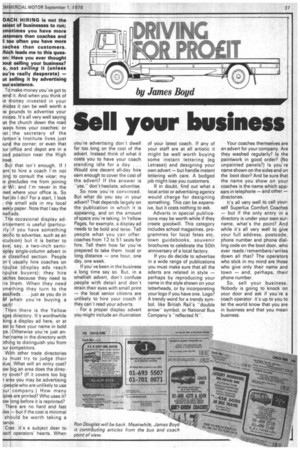Sell your business
Page 39

If you've noticed an error in this article please click here to report it so we can fix it.
by James Boyd
OACH HIRING is not the asiest of businesses to run; metimes you have more istomers than coaches and II too often you have more Dachas than customers. /Filch leads me to this queson: Have you ever thought out selling your business? o, not selling it (unless ou're really desperate) — ut selling it by advertising our existence.
To make money you've got to )end it. And when you think of le money invested in your thicies it can be well worth a .w pounds to advertise your irvices. Its all very well saying at the church down the road ways hires your coaches; or tat the secretary of the /omen's Institute lives just iund the corner; or even that )ur office and depot are in a pod position near the High treet.
But that isn't enough. If I ant to hire a coach I'm not )inc to consult the vicar; my precludes me from joining leWI; and I'm never in the reel where your office is. So hat do I do? For a start, I look the small ads in my local eek y paper. Note that I say the nall ads.
The occasional display ad)rtis.emerit is useful (particurly if you have something )eci'ic to advertise, such as an (cu sion) but it is better to 3ve, say, a two-inch semisplay single-column advert in le classified section. People n't usually hire coaches on npulse (display ads reach ripulse buyers); they hire mches because they need to ire them. When they need mething they turn to the assifieds . . just as you do in M when you're buying a )ach!
Then there is the Yellow ages directory. It's worthwhile king a display ad here, or at ast to have your name in bold 'pe. Otherwise you're just an:her name in the directory with )thi g to distinguish you from )ur ompetitors.
W th other trade directories )u ust try to judge their Ilue What will an entry cost? ow ig an area does the direciry over? (If it covers too big 1 ar a you may be advertising people who are unlikely to use pur company.) How many )pie are printed? Who uses it? ow ong before it is reprinted? Th re are no hard and fast Iles but if the cost is minimal sh uld be worth taking a ian e.
Cist it's a subject dear to )ac operators' hearts. When
you're advertising don't dwell for too long on the cost of the advert. Instead think of what it costs you to have your coach standing idle for a day . . . Would one decent all-day hire earn enough to cover the cost of the advert? If the answer is "yes,don't hesitate, advertise.
So now you're convinced. But what do you say in your advert? That depends largely on the publication in which it is appearing, and on the amount of space you're taking. In Yellow Pages, for example, a display ad needs to be bold and terse. Tell people what you can offer. coaches from 12 to 51 seats for hire. Tell them how far you're prepared to take them local or long distance — one hour, one day, one week.
If you've been in the business a long time say so. But, in a smallish advert, don't confuse people with detail and don't strain their eyes with small print — the local senior citizens are unlikely to hire your coach if they can't read your adverts.
For a proper display advert you might include an illustration of your latest coach. If any of your staff are at all artistic it might be well worth buying some instant lettering (eg Letraset) and designing your own advert — but handle instant lettering with care. A bodged job might lose you customers.
If in doubt, find out what a local artist or advertising agency would charge for designing something. This can be expensive, but it costs nothing to ask.
Adverts in special publications may be worth while if they create goodwill. This category includes school magazines, programmes for local fetes etc, town guidebooks, souvenir brochures to celebrate the 50th anniversary of a local factory.
If you do decide to advertise in a wide range of publications you must make sure that all the aderts are related in style — perhaps by reproducing your name in the style shown on your letterheads, or by incorporating your logo if you have one. Logo? A trendy word for a trendy symbol, like British Rail's "double arrow'' symbol, or National Bus Company's "reflected N". Your coaches themselves are an advert for your company. Are they washed regularly? Is the paintwork in good order? (No unpainted panels?) Is you're name shown on the sides and on the boot door? And be sure that the name you show on your coaches is the name which appears in telephone — and other — directories.
It's all very well to call yourself Superlux Comfort Coaches — but if the only entry in a directory is under your own surname, what's the point? And while it's all very well to give your full address, postcode, phone number and phone dialling code on the boot door, who ever reads/remembers/writes down all that? The operators who stick in my mind are those who give only their name and town — and, perhaps, their phone number.
So, sell your business. Nobody is going to knock on your door and ask if you're a coach operator it's up to you to let the world know that you are in business and that you mean business.




































































































